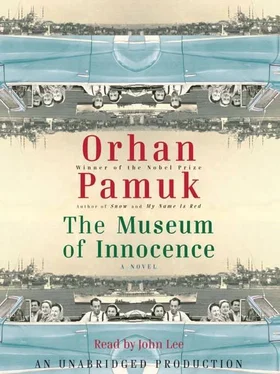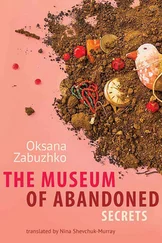During intermission, there was cautious talk about the preparations for our trip to Europe, and about beginning to appear together in public, but I never mentioned my mother’s thoughts on an engagement party. I, too, had slowly come to see that an engagement party would bring only trouble, encouraging a lot of gossip, and causing disquiet even inside the family: If we invited a great many the gossip would be of how many we’d invited; if we invited fewer the gossip would be of how few. It seemed to me that Füsun was slowly coming to the same awareness, or at least I thought this was why she, too, avoided talk of the engagement. So it was without discussion that we somehow agreed to skip the engagement and marry at once after our return from Europe. As we smoked our cigarettes during the intervals between films, and at the Beyoğlu patisseries we’d gotten into the habit of visiting afterward, our greatest pleasure was dreaming up things we’d do on our trip. Füsun had bought a book written for Turks called Europe by Car and always took it along to the cinema, and as we turned the pages we would plan our itinerary. We would spend our first night in Edirne, then drive straight through Yugoslavia and Austria. I bought my own guidebooks, as well, and Füsun especially liked to look at the photographs of Paris in them. “Let’s go to Vienna, too,” she would say. Sometimes staring at the pictures of Europe in a book, she would fall into a strange, mournful silence as she drifted off into a daydream.
“What’s wrong, darling? What are you thinking?” I would ask her.
“I don’t know,” Füsun would say.
Because Aunt Nesibe, Füsun, and Çetin had never been outside Turkey before, they were applying for their first passports. To save them from the torture of visiting the various state bureaucracies and the torment of waiting in all those long lines, I brought in Selami, the police chief who took care of such matters for Satsat. (Careful readers will remember that it was this same retired constable whom I had asked to track down Füsun and her family eight years before.) Anchored by love, I had not been outside Turkey for nine years, and so it was I came to discover that I no longer felt the need for travel, where before, if I’d been cooped up in this country for more than three or four months, I’d be out of sorts.
It was a hot summer day when we went to sign papers at the Security Services Passport Office at the Governor’s Headquarters in Babıali. This old building, once home to prime ministers, pashas, and grand viziers, had since been the scene of numerous raids and political murders described in lycée history books, but as with many great Ottoman buildings that had survived into the Republican era, its former gilded splendor had worn away, as thousands of weary souls entered it daily to spend hours standing in line, first to acquire documents, then to have them stamped, and then signed, an eternity that inevitably led to arguments and scuffles, the whole scene suggesting Judgment Day. In the heat and humidity, the documents in our hands quickly turned soggy.
Toward evening we were sent to the Sansaryan Building in Sirkeci for another document. As we walked down Babıali Hill, just before the old Meserret Coffeehouse, Füsun stepped into a small teahouse without asking permission of any of us and sat down at a table.
“What is it with her now?” said Aunt Nesibe.
While she and Çetin Efendi waited outside, I went in.
“What’s wrong, darling, are you tired?”
“I’ve had it. I don’t want to go to Europe anymore,” said Füsun. She lit a cigarette, inhaling deeply. “The rest of you can go, by all means-get your passports-but I’ve run out of energy.”
“Darling, hang on, we’re almost there.”
She held out for a while longer, showing a bit of temper, but in the end, inevitably, she came with us, my beauty. We endured a similar tantrum when applying for visas at the Austrian Consulate. Hoping to save them from the queues and humiliating interviews, I’d prepared documents describing Aunt Nesibe, Füsun, and also Çetin Efendi as highly paid “specialists” in Satsat’s employ. They granted us all visas, all but Füsun, who because of her young age, looked suspicious, and was called for a visa interview. I went in with her.
Six months earlier, an angry applicant who had been repeatedly denied visas over many years had shot an employee of the Swiss Consulate in the head four times; following that incident the visa sections of consulates had instituted strict security measures. Now applicants were no longer permitted to converse face-to-face with European visa officials, but rather, like death row prisoners in American films, were separated from the officials by bars and bulletproof glass, and obliged to converse by phone. Still people would crowd the entrance, prodding and pushing as they struggled to reach the visa section, or to enter the garden or courtyard. Turkish staffers (particularly in the German Consulate, where it was said that in the space of two days they became “more German than the Germans”) would scold the crowd for failing to line up decorously, shoving them around and singling out the ill-attired to say, “You’re wasting your time here,” by way of thinning the herd. And so most applicants were practically jubilant to be granted interviews, taking their place nervously before the bars and the bulletproof glass, like so many students sitting down to a difficult exam, peaceful and compliant as lambs.
Because we’d pulled strings, Füsun had no need to wait in any queue, and went into the interview smiling; but when, shortly, she emerged, she was purple in the face, and without so much as looking in my direction she went out to the street. I followed her out, catching her when she paused to light a cigarette. She wouldn’t tell me what had happened, but went into the National Sandwich and Refreshment Palace, where, having taken a seat, she announced, “I don’t want to go to Europe anymore. I give up.”
“What happened? Aren’t they giving you a visa?”
“They asked me about my whole life. They even asked why I got divorced. Even how did I support myself. They even asked me that. So I’m not going to Europe. I don’t want visas from any of them.”
“I can find another way to arrange things,” I said. “Or we could take a car ferry straight to Italy.”
“Kemal, believe me, I no longer want to take this trip to Europe. I can’t even speak the languages, and it makes me ashamed.”
“Darling, we could still see just a bit of the world… In other places, there are people who live differently, and more happily. We can walk down their streets holding hands. There’s more to this world than Turkey.”
“Ah, to be worthy of you I need to see some of Europe, is that it? Well, I’ve also given up on the idea of marrying you.”
“We’ll be so happy in Paris, Füsun.”
“You know how stubborn I can be, Kemal. Don’t pressure me, you’ll only make me dig in.”
But I did press her, and years later, whenever I recalled how I’d insisted and felt the sting of remorse, I also remembered that it had been my fantasy for years to make love to Füsun in a hotel along the journey. With the help of Selim the Snob, who imported paper from Austria, Füsun’s visa came through one week later. It was around the same time that we were also able to obtain the documentation to take the car abroad. We were sitting in a box at the Palace Cinema when I gave Füsun her passport, whose pages were now covered with colorful visas for all the countries we’d be visiting en route to Paris; at that moment I felt a strange pride at being a good husband. Years before, when I was seeing ghosts of Füsun on every corner, I’d encountered her apparition at the Palace Cinema, too. Taking her passport, she smiled at first, before assuming a dour expression as she turned the pages, inspecting each visa in turn.
Читать дальше












